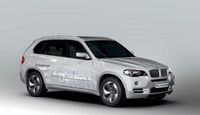BMW showcases Variable Twin Turbo Diesel Hybrid Concept
MUNICH, GERMANY - BMW has intelligently combined its superior diesel expertise with innovative BMW ActiveHybrid technology in a showcase Geneva motor show concept car.
The concept study, based on a BMW X5, demonstrates the unique potential of technology developed as part of the BMW EfficientDynamics program.
Boasting the world’s first all-aluminium diesel with a specific power output of over 100bhp per litre of capacity, and a generator as part of a mild hybrid concept, the vehicle uses a frugal 6.5 litres of fuel per 100 kilometres and emits just 172 grams of CO2 per kilometre.
The efficient and clean Sports Activity Vehicle has not forgone BMW’s characteristic driving dynamics with acceleration from 0 to 100 km/h taking just 8.9 seconds. Nor does it eschew the typical comfort and versatility expected of a large SAV.
The BMW Vision EfficientDynamics features a 2.0-litre 4-cylinder diesel engine with Variable Twin Turbo, third generation common rail injection and all-aluminium gearbox housing.
The engine develops 150 kW of power and 400 Nm of torque between 2,000 and 2,250 rpm.
A compact generator, integrated in the gearbox housing, contributes to vehicle acceleration with 15 kW and a maximum torque of 210 Nm. The total output of the vehicle is 165 kW.
The compact generator replaces a conventional generator powered directly by the engine and electrical energy is produced by Brake Energy Regeneration with a unique degree of efficiency without impairing the drive torque of the engine.
The high-power electronic system – for the first time flange-mounted directly onto the gearbox – allows a compact design which has never been possible before, as well as a sound arrangement of the hybrid components.
A high-performance, package-appropriate lithium-ion battery integrated in the luggage compartment supplies the vehicle’s electrical system.
The technology applied in the concept car aims to support the combustion engine in generating dynamic performance as well as operating as many vehicle functions as possible electrically by producing the electrical power by means of Brake Energy Regeneration.
Both functions are performed by the generator. Under load it provides additional drive torque and during trailing throttle and braking phases it feeds electrical power to the battery. This form of Brake Energy Regeneration is a further development of the principle which is already used in the BMW M3.
In this fashion, electricity is generated for the vehicle power supply at no cost and without impairing driving dynamics.
The concept car is also fitted with a highly efficient 8-speed automatic transmission developed jointly by BMW and ZF Getrieb GmbH.
Ready for serial production, the transmission makes an additional contribution to lowering exhaust emissions and fuel consumption with its broad spread of gears, reduced inner losses, direct connection to the engine and minimised torque-converter slip.
A solar roof which acts as an additional energy source for the vehicle’s power supply, independent of the engine, is also a feature of the concept study. The energy from the photovoltaic units can be either stored or used immediately.
The aero wheels of the concept car further optimise aerodynamics reducing fuel consumption.
The concept car, to be unveiled at the Geneva motor show next month, adopts a Mild Hybrid approach with a 4-cylinder diesel engine in contrast to the BMW Concept X6 ActiveHybrid which combines a Full Hybrid concept and an 8-cylinder petrol engine.
With these differing approaches BMW is demonstrating the large breadth of potential hybrid applications, tailored to specific models.



